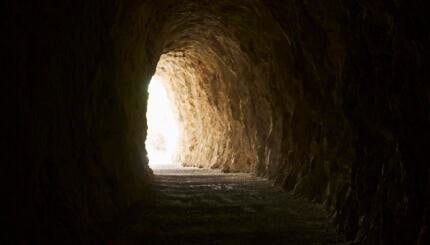Commentary on Parashat Vayetzei, Genesis 28:10-32:3
Parashat Vayetzei begins with one of the most magnificent spiritual visions of the Torah: Jacob’s ladder.
A young man, Jacob flees his home in Canaan to escape the murderous wrath of his brother Esau, whom he had cheated out of the firstborn’s birthright and blessing, and to find a wife in his family’s ancestral lands. On his first night, Jacob comes upon a seemingly ordinary place and sets up camp, using a stone as a pillow.
Overnight, Jacob has a spectacular dream in which he sees a ladder reaching from earth all the way to heaven, with angels moving up and down it. In the dream, God appears and promises Jacob that the very ground he lies upon will belong to his descendants, who will be as numerous as the dust of the earth and will spread out in all four directions: west, east, north and south.
In a deep spiritual experience, the seer, the seeing and the seen are often intertwined. The Hebrew text reflects this confluence. Forms of the word rosh, meaning head, are used to describe Jacob’s actual head, the top of the ladder and the stone of the altar, hinting at a connection between the three. Hebrew is gendered, always using “he” or “she” instead of “it” — even for objects. Read literally, Jacob put his head on a stone pillow and beheld a ladder with “his” head (Jacob’s head? the ladder’s?) reaching the very heavens. The divine messengers are ascending and descending “in him” — phrasing that might refer to ladder or to the dreamer himself, or both.
With your help, My Jewish Learning can provide endless opportunities for learning, connection and discovery.
Jacob awakens apparently spiritually transformed and exclaims: “How awesome is this place! This is none other than the abode of God and the gateway to heaven.” Jacob takes the stone upon which he had rested his head and makes it an altar to God, channeling his individual, mystical experience of the divine into a concrete ritual of organized religion.
But as morning dawns brighter, Jacob seems less sure of what he has seen. He now declares: “If God remains with me, protecting me on this journey that I am making, and giving me bread to eat and clothing to wear, and I return safe to my father’s house — the Lord shall be my God.” This new declaration smacks of doubt, and one might wonder: Did Jacob’s dream vision really transform him?
Given what transpires next, one could argue that Jacob was not spiritually transformed by his mystical encounter. He soon finds himself embroiled in two decades of domestic drama and business struggles, married to two sisters and father of twelve children, all while managing a conniving father-in-law. As far as we know, Jacob never shares his beautiful ladder dream with his wives, though he does tell them about a dream he has on the subject of sheep husbandry.
My teacher, Rabbi Zalman Schachter-Shalomi, taught that most people, like Jacob, have spiritual experiences. They may not be as dramatic as Jacob’s vision of the heavenly ladder, but there are times when we experience something ineffable and awe-inspiring. Then, the days go by, the experience fades and the spiritual realm can easily be lost and forgotten. Like Jacob, we are faced with the challenge of figuring out how to integrate the transcendent into our daily lives. However, doing so is a worthy goal: In Jewish tradition, spiritual experiences are seldom an end in themselves, but serve as motivation to bring godliness down to earth. Like the angels on the ladder, we can ascend to heights, but the aim is to come back down, bearing inspiration and energy for the benefit of all.
Spiritual practices like meditation and prayer are the vessels that can hold our experiences so that they continue to influence our day-to-day lives. If you have a spiritual experience, you can also record it, share it in a supportive setting, express it creatively or create a practice with it that can nourish you in the future, especially in times of need.
As Jacob finally departs from Haran with his large family, angels “come upon” him — the same Hebrew verb used in the opening episode of the parasha, in which Jacob “came upon” the place where he had his first vision. In Etz Hayim: Torah and Commentary, Rabbi Harold Kushner asks, “Have angels been accompanying Jacob throughout those 20 years, so that he prospered in all that he did, and only now as they take their leave of him is he able to see them?” Perhaps we too are accompanied by angels and only privileged to see them at certain moments.



